|
|
|
Sort Order |
|
|
|
Items / Page
|
|
|
|
|
|
|
| Srl | Item |
| 1 |
ID:
165906
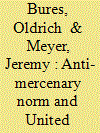

|
|
|
|
|
| Summary/Abstract |
This article offers an analysis of the influence of the anti-mercenary norm on the United Nations’ use of services provided by private military and security companies (PMSCs). It follows a constructivist approach which focuses on violations of the anti-mercenary norm within the UN system and on the justifications and condemnations of these violations in official UN documents. The findings suggest that while the anti-mercenary norm is no longer puritanical, two key aspects of the norm—the lack of a proper cause and the lack of control—remain influential within the UN system. Although all parts of the UN system nowadays routinely use a wide variety of services of PMSCs and the UN Secretary-General officially sanctioned security outsourcing in 2011, the UN continues to insist that it is only using PMSCs as a last resort, when no other options are available. The continuing need to justify the use of PMSCs’ services suggests that this practice challenges both the long-established identity of the UN as a key anti-mercenary norm entrepreneur and its ontological security.
|
|
|
|
|
|
|
|
|
|
|
|
|
|
|
|
| 2 |
ID:
179552
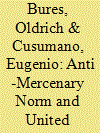

|
|
|
|
|
| Summary/Abstract |
A prominent anti-mercenary norm entrepreneur in the second half of the twentieth century, the United Nations (UN) has become an equally prominent user of Private Military and Security Companies (PMSCs) services in the twenty-first century. In this article, we explain the gap between UN talk and action on private providers of security as a form of organized hypocrisy. To map the mismatch between UN rhetoric and behaviour in a measurable fashion, we combined official data on the use of PMSCs with an in-depth content analysis of the reports written by the UN Working Group on Mercenaries and an examination of the UN Department of Safety and Security (UNDSS) contracting policy. The Working Group’s very negative portrayal of PMSCs and the UNDSS caveat that armed contractors should only be used as a last resort and stands in stark contrast with UN agencies’ widespread use of private security providers. Although a decoupling between talk and action is often inevitable for complex organizations simultaneously pursuing contradictory objectives like the UN, our findings have important implications for peacekeeping. Most notably, organized hypocrisy is in danger of challenging the UN’s credibility as a norm entrepreneur, hindering the effectiveness of its agencies’ outsourcing practices and delaying the reform of UN peacekeeping and crisis management at large.
|
|
|
|
|
|
|
|
|
|
|
|
|
|
|
|
| 3 |
ID:
188048
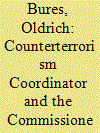

|
|
|
|
|
| Summary/Abstract |
Both national and EU officials have repeatedly emphasized the need for a comprehensive and strongly coordinated EU counterterrorism policy in order to bring together the disparate measures taken by the member states, avoid duplication of action, involve uninterested member states, and to present the EU as a coherent counterterrorism actor. To address these concerns, the EU member states agreed to create the position of an EU Counterterrorism Coordinator in 2005, only to be followed in 2016 with the position of an EU Commissioner for Security Union. A question therefore arises as to whether the EU needs two counterterrorism coordinators. This article addresses this question by utilizing Pierre Bourdieu’s concepts of field, capital, doxa, and habitus and argues that there is no apparent rationale for the coexistence of two EU Counterterrorism Coordinators with an overlapping mandate and minimal material, similar cultural and vastly disparate symbolic capital.
|
|
|
|
|
|
|
|
|
|
|
|
|
|
|
|
| 4 |
ID:
136863
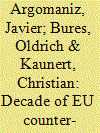

|
|
|
|
|
| Summary/Abstract |
The Treaty on the European Union (EU) stipulates that one of the key objectives of the Union is to provide citizens with a high level of safety within an Area of Freedom, Security and Justice (AFSJ). Given that the fight against terrorism is a prominent aspect of this general objective, it is remarkable that, in spite of its political relevance and decade-long history, it has only relatively recently received due attention in the academic community.1 At the time of writing, only a handful of post-9/11 edited volumes and special issues have focused on specific aspects of the EU counterterrorism efforts2 and initial monographs on the subject have only been relatively recently published by the three editors behind this special issue: Argomaniz3 has produced a theoretically informed assessment of the coherence of the EU response, Bures4 has examined the extent to which the EU can offer an added value in the fight against terrorism in Europe and Kaunert5 has studied how counter-terrorism has been a driver in the process of construction of the EU's AFSJ.
|
|
|
|
|
|
|
|
|
|
|
|
|
|
|
|
| 5 |
ID:
068303
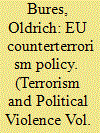

|
|
|
| 6 |
ID:
172200
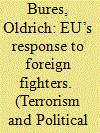

|
|
|
|
|
| Summary/Abstract |
The conflicts in Syria and Iraq have put foreign fighters—individuals travelling from other countries to engage in these conflicts—high on the security agenda at both the national and EU level. Drawing on theoretical arguments previously advanced to explain the haphazard evolution of the EU’s counterterrorism efforts after September 11, 2011, this articles discusses the emergence and persistence of key challenges that have hampered the EU response to security threats posed by 5,000 European foreign fighters between 2013 and early 2017. These include the absence of a common EU-level definition; the differences regarding the scope and perceptions of the threats posed to individual Member States; the lack of consensus on root causes of terrorism and radicalization; and the differences among Member States when it comes to addressing the difficulties of criminal prosecution of foreign fighters.
|
|
|
|
|
|
|
|
|
|
|
|
|
|
|
|
| 7 |
ID:
083815
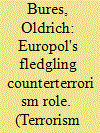

|
|
|
|
|
| Publication |
2008.
|
| Summary/Abstract |
This article offers an analysis of Europol's counterterrorism role. Based on official EU documents, internal reports, and secondary sources, it dissects the contemporary counterterrorism activities of both Europol and the informal arrangements outside of the EU structure that are frequently utilized by some EU Member States. Although Europol does not perform any indispensable counterterrorism functions at the moment due to its limited powers and lack of trust from national agencies, the author contends that Europol has the potential to make a substantial contribution to the fight against terrorism.
|
|
|
|
|
|
|
|
|
|
|
|
|
|
|
|
| 8 |
ID:
097179
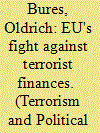

|
|
|
|
|
| Publication |
2010.
|
| Summary/Abstract |
This article offers an analysis of the European Union's (EU) efforts in the fight against terrorist finances. Following the 9/11 attacks, the EU has adopted the relevant United Nations counterterrorism resolutions as well as the special recommendations of Financial Action Task Force. In addition, the EU has developed its own measures spanning across all of its three pillars. There is, however, a cause for concern that some of these measures have not been properly implemented, while others have been criticized on legal, transparency, legitimacy, and efficiency grounds. These shortcomings are not only due to EU's own internal obstacles, but also result from the EU's uncritical adoption of the prevailing smart sanctions and money-laundering regimes, which are based on a number of unwarranted assumptions that do not reflect the nature of contemporary terrorist threats in Europe.
|
|
|
|
|
|
|
|
|
|
|
|
|
|
|
|
| 9 |
ID:
116685
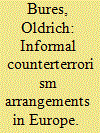

|
|
|
|
|
| Publication |
2012.
|
| Summary/Abstract |
Most existing analyses of counterterrorism cooperation among EU Member States have focused on the formal EU agencies and institutions, which may be regarded as direct vertical extensions of political and executive power in the EU Member States. When it comes to practical cooperation, however, it appears that national security agencies in Europe often prefer to utilize horizontal non-EU counterterrorism arrangements. Because of their flexibility and relative independence from national governments, as well as their ability to include a broader range of participants on equal footing, it is generally assumed that these informal arrangements are more suitable for achieving common goals than their more formal and hierarchical EU counterparts. This article argues that the informal non-EU arrangements also suffer from a number of distinct shortcomings. This, in turn, questions the wisdom of the post-9/11 response to terrorism by putting yet more formal EU bodies and/or informal arrangements on the already crowded map of security bodies in Europe.
|
|
|
|
|
|
|
|
|
|
|
|
|
|
|
|
| 10 |
ID:
173845
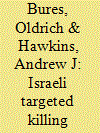

|
|
|
|
|
| Summary/Abstract |
This article offers a contextualized comparison of Israeli targeted killing operations aimed at Palestinian high value targets before and during the Second Intifada. Utilizing four indicators that can be directly attributed to a particular operation (elimination of the intended target, civilian and non-target casualties, directly-linked retaliatory attacks, and adverse political consequences), we analyzed thirty-eight Israeli targeted killing operations to determine whether the policy changes introduced during the Second Intifada (regarding the scale, legal basis, and targeting methods) resulted in increased operational success. Our findings indicate that according to all but the first indicator, Israeli targeted killing operations conducted during the Second Intifada were less successful than those conducted prior to this conflict.
|
|
|
|
|
|
|
|
|
|
|
|
|
|
|
|
| 11 |
ID:
115357
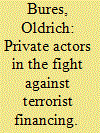

|
|
|
|
|
| Publication |
2012.
|
| Summary/Abstract |
In several areas of the post-9/11 efforts to fight terrorism, private rather than public entities have shouldered the bulk of the burden. This has been especially the case in the fight against terrorist financing where private financial institution are legally obliged to monitor the billions of daily financial transactions and report the suspicious ones to public authorities for further investigation. Since private financial institutions are geared toward making profits and where the money has come from has traditionally not been of great interest to them, it is important to investigate how they have coped with these demanding requirements.
|
|
|
|
|
|
|
|
|
|
|
|
|
|
|
|
| 12 |
ID:
069897
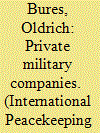

|
|
|
|
|
| Publication |
2005.
|
| Summary/Abstract |
This article analyses the perils and benefits of outsourcing UN peacekeeping to private military companies (PMCs). Various PMCs have a proven capacity to perform at least some peacekeeping functions. Although experts have expressed serious doubts whether their capacity to do peacekeeping will always translate into the achievement of peace and security, the author contends that PMC peacekeeping should not be dismissed on ideological or moral grounds when the choice is either a PMC operation or none at all. It is, however, imperative that the perils of using PMCs are addressed before peacekeeping is turned over to the private market. In particular, a set of clear mechanisms of accountability, control and transparency of the PMCs needs to be put in place.
|
|
|
|
|
|
|
|
|
|
|
|
|
|
|
|
| 13 |
ID:
127806
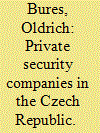

|
|
|
|
|
| Publication |
2014.
|
| Summary/Abstract |
This article examines the impact of the practices of private security companies (PSCs) upon the fields of security and politics in the Czech Republic. It focuses on the scandalous case of the largest Czech private security company, Agency of the White Lion (ABL)/Mark2 Corporation (M2.C), whose founder attempted to create a business-firm-party by performing a hostile takeover of an existing minor political party. By applying the global security assemblages model and drawing on the recent literature on the commodification of security, this article situates the case of ABL/M2.C within the larger socio-political-legal-economic context of the booming private security industry, whose extensive linkages with Czech politics are best characterized as a 'reverse revolving door' phenomenon. This phenomenon in turn suggests a possibility that the continuing absence of specific legislation to regulate the activities of PSCs is due to too much, rather than too little, political interest in the activities of these organizations. This is problematic because the practices of PSCs have already contributed to a significant rearticulation of the Czech security field by enhancing the commodification of security, while ABL's use of security methods for political purposes has rearticulated the field of politics in a number of profoundly negative ways.
|
|
|
|
|
|
|
|
|
|
|
|
|
|
|
|
| 14 |
ID:
074964
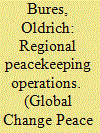

|
|
|
|
|
| Publication |
2006.
|
| Summary/Abstract |
This article provides an analysis of the perils and benefits of regional peacekeeping operations (PKOs), with a special focus on their ability to serve as a complement to and/or enhancement of their United Nations (UN) counterparts. The author contends that there are two sides to the debate about the regionalization of peacekeeping. On one hand, regional PKOs offer a number of advantages to their purely UN counterparts, primarily due to their proximity to conflict zones, common culture, and greater legitimacy. On the other hand, past experience with regional PKOs suggests that there are significant problems with the idea of regionalization as an optimum mechanism for organizing PKOs. Serious doubts remain about whether the need and desire for cooperation between the UN and regional arrangements (RAs) will ultimately translate into a workable and efficient system.
|
|
|
|
|
|
|
|
|
|
|
|
|
|
|
|
| 15 |
ID:
136864
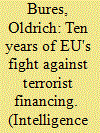

|
|
|
|
|
| Summary/Abstract |
This article offers a critical assessment of the post-9/11 efforts of the European Union (EU) in the fight against terrorist finances. Using the EU's own goals from its action plans and counterterrorism strategies as the baseline criteria, it examines how successful the EU has been in implementing the relevant aspects of various United Nations Security Council counterterrorism resolutions, the special recommendations of the Financial Action Task Force, and its own measures spanning across all of its three pre-Lisbon pillars. In particular, the article seeks to answer the following questions: (1) What and how much of its own counter-terrorism plans has the EU managed to achieve since 9/11? and (2) What lessons can be learned from the hitherto successes and failures for future EU efforts to counter terrorist financing? Special attention is paid to the thus far neglected role of the private sector in the fight against terrorist financing.
|
|
|
|
|
|
|
|
|
|
|
|
|
|
|
|
| 16 |
ID:
184109
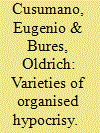

|
|
|
|
|
| Summary/Abstract |
International organisations (IOs) have increasingly resorted to private military and security companies (PMSCs) as providers of armed protection, training, intelligence, and logistics. In this article, we argue that IOs, seeking to reconcile conflicting international norms and member states’ growing unwillingness to provide the manpower required for effective crisis management, have decoupled their official policy on and actual use of PMSCs, thereby engaging in organised hypocrisy. Due to its stricter interpretation of norms like the state monopoly of violence, the United Nations (UN) has showcased a more glaring gap between talk and action than the European Union (EU) and the North Atlantic Treaty Organization (NATO), which display a more pragmatic, but not entirely consistent, approach to the use of PMSCs. By examining the decoupling between UN, EU, and NATO official contractor support doctrines and operational records, this article advances the debate on both security privatisation and organised hypocrisy.
|
|
|
|
|
|
|
|
|
|
|
|
|
|
|
|
|
|
|
|
|